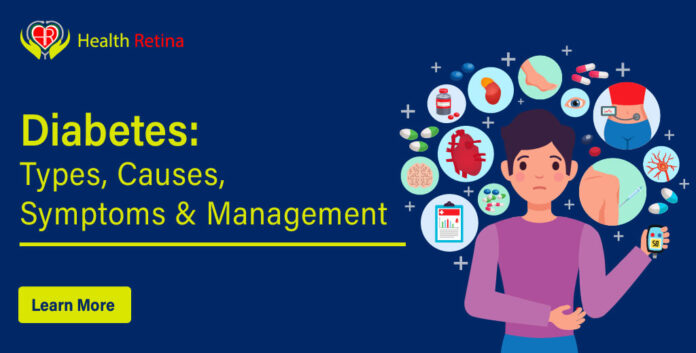What is Diabetes?
Diabetes is a chronic disease that happens when the pancreas is presently not ready to make insulin, or when the body can’t take advantage of the insulin it produces.
Insulin is a chemical made by the pancreas, that behaves like a key to let glucose from the food we eat pass from the circulatory system into the cells in the body to create energy. All carb food varieties are separated into glucose in the blood. Insulin assists glucose with getting into the cells.
Types of Diabetics
There are a few different sorts of diabetes:
Type 1: Type 1 diabetes is an immune system sickness. The resistant framework assaults and annihilates cells in the pancreas, where insulin is made. It is unclear what causes this assault.
Type 2: Type 2 diabetes happens when your body becomes impervious to insulin, and sugar develops in your blood. It’s the most ordinary sort — around 90% to 95%Trusted Source of individuals living with diabetes have type 2.
Gestational: Gestational diabetes is high glucose during pregnancy. Insulin-hindering chemicals created by the placenta cause this sort of diabetes.
Causes of diabetics
The main cause of diabetics changes by type. But no matter what kind of diabetes you have, it can lead to an abundance of sugar in the blood. An excess of sugar in the blood can prompt severe health problems.
Symptoms
Diabetes Symptoms depend on how high your glucose is. Certain individuals, particularly in the event that they have prediabetes or type 2 diabetes, might not have side effects. In type 1 diabetes, Symptoms will generally come on rapidly and be more serious.
Some of the Symptoms of type 1 diabetes and type 2 diabetes are:
- Feeling thirstier than expected.
- Peeing frequently.
- Losing weight without trying.
- Presence of ketones in the pee. Ketones are a side-effect of the breakdown of muscle and fat that happens when there’s insufficient free insulin.
- Feeling drained and feeble.
- Feeling bad-tempered or having other temperament changes.
- Having blurry vision.
- Having slow-recuperating wounds.
- Getting a lot of contaminations, like gum, skin, and vaginal diseases.
Type 1 diabetes can begin at whatever stage in life. But it frequently begins during childhood or teen years. Type 2 diabetes, the more normal sort, can create at whatever stage in life. Type 2 diabetes is more in people older than 40.
Prevention
Type 1 diabetes can’t be forestalled. But the healthy lifestyle decisions that help treat prediabetes, type 2 diabetes, and gestational diabetes can likewise assist with forestalling them:
Eat healthy foods. Pick food sources lower in fat and calories and higher in fiber. Focus on fruits, vegetables, and entire grains. Eat a variety to hold keep from feeling bored.
Get more active work. Attempt to get around 30 minutes of moderate oxygen-consuming action on most days of the week. Or on the other hand, plan to get no less than 150 minutes of moderate-vigorous activity a week. For instance, go for an energetic everyday stroll. If you can’t fit in a long exercise, split it up into smaller sessions over the course of the day.
Lose excess pounds. If you’re overweight, losing even 7% of your body weight can lower the risk of diabetes. For example, if you weigh 200 pounds (90.7 kilograms), losing 14 pounds (6.4 kilograms) can lower the risk of diabetes.
But don’t try to lose weight during pregnancy. Talk to your provider about how much weight is healthy for you to gain during pregnancy.
To keep your weight in a healthy range, work on long-term changes to your eating and exercise habits. Remember the benefits of losing weight, such as a healthier heart, more energy, and higher self-esteem.
Sometimes drugs are an option. Oral diabetes drugs such as metformin (Glumetza, Fortamet, others) may lower the risk of type 2 diabetes. But healthy lifestyle choices are important. In the event that you have prediabetes, have your blood sugar checked at something like once per year to ensure you haven’t created type 2 diabetes.
Diabetics Treatments
Accepting your diabetes drugs as suggested by your doctor is vital. Left untreated, diabetes can prompt serious, even perilous entanglements. Inconveniences can prompt loss of fundamental body capabilities, (for example, with your kidneys), visual impairment, the requirement for removal of toes or feet, and even passing (particularly from cardiovascular illness). By accepting your meds as suggested, you enormously diminish your risk of creating diabetes-related confusion.
Treatment includes changes in way of life (diet and exercise), in addition to medication. Diabetes can be treated with oral medicines (pills), insulin, as well as other infused medications. Individuals with type 1 diabetes generally need insulin. Individuals with type 2 diabetes normally need treatment with oral medications for a few or even numerous years, yet may ultimately require insulin to keep up with glucose control.




